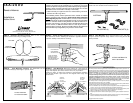
EXA-2000
Remote Antenna
Installation
Instructions
(619) 438-7000 • FAX (619) 438-7043
USA & Canada (800) 421-1587 & (800) 392-0123
Toll Free FAX (800) 468-1340
The EXA-2000 Remote Antenna is designed to enhance the radio range of Linear’s
receivers. This antenna can be connected to the “F” connector on many Linear
receivers to improve their range when they must be located in poor signal reception
locations. Usually an increase of 20-30% range can be expected. The versatile
EXA-2000 can be mounted either vertically or horizontally.
✶ NOTE: Generally, the higher the antenna is mounted above ground level,
the better the radio range will be.
The EXA-2000 provides maximum performance when mounted and installed
properly according to these instructions. Please read the entire instructions
before beginning any work. The EXA-2000 is a 1/2 wave, center fed, antenna
composed of two parts: an antenna assembly with a ten-foot, 75-ohm coaxial cable
with an “F” connector and two mounting brackets. The cable connects to the “F”
connector on the receivers. If the antenna must be mounted further than ten feet
from the receiver, an additional extension cable of 15 feet may be used for a
maximum cable run of 25 feet. Because of the cable resistance, the performance
of the EXA-2000 may be degraded by using more than 25 feet of cable.
STEP 1
Identify Parts.
Lay out and identify the parts as shown.
Check to be sure all items were included in the kit.
STEP 2
Determine mounting location. Refer to the antenna
patterns shown to determing mounting location.
STEP 3
Attach mounting brackets.
Snap the mounting brackets
onto antenna as shown. Attaching the brackets in opposite directions
improves stability of the antenna mounting.
STEP 4
Wall Mounting
. Mount the EXA-2000 on the wall high
enough to achieve optimum range. Mount to wall using the two #8
screws provided.
STEP 5
Post Mounting (Vertical).
The EXA-2000 can be
mounted vertically by attaching to a post as shown.
STEP 6
Attic Mounting.
Attach the antenna to a joist, beam or
some other object in the attic. Try to keep the antenna as far away from
large metal objects (duct work, furnace vents, etc) as possible.
Caution: In attics, or under room structures, metal foil back insulation
and drywall metalic vapor barriers will degrade radio range and
performance.
LINEAR LIMITED WARRANTY
This Linear product is warranted against defects in material and workmanship for twelve (12) months. The
Warranty Expiration Date is labeled on the product. This warranty extends only to wholesale customers
who buy direct from Linear or through Linear’s normal distribution channels.
Linear does not warrant this
product to consumers.
Consumers should inquire from their selling dealer as to the nature of the dealer’s
warranty, if any.
There are no obligations or liabilities on the part of Linear Corporation for
consequential damages arising out of or in connection with use or performance of this product or
other indirect damages with respect to loss of property, revenue, or profit, or cost of removal,
installation, or reinstallation.
All implied warranties, including implied warranties for merchantability and
implied warranties for fitness, are valid only until Warranty Expiration Date as labeled on the product.
This
Linear Corporation Warranty is in lieu of all other warranties express or implied.
For warranty service on Linear equipment return product, at sender’s expense to: Linear Corp. Repairs
Dept., 2580 Pioneer Avenue, Suite C, Vista, CA 92083
Linear radio controls provide a reliable communications link and fill an important need in portable wireless
signalling. However, there are some limitations which must be observed.
✶
For U.S. installations only: The radios are required to comply with FCC Rules and Regulations as Part
15 devices. As such, they have limited transmitter power and therefore limited range.
✶
A receiver cannot respond to more than one transmitted signal at a time and may be blocked by radio
signals that occur on or near their operating frequencies, regardless of code settings.
✶
Changes or modifications to the device may void FCC compliance.
✶
Infrequently used radio links should be tested regularly to protect against undetected interference or
fault.
✶
A general knowledge of radio and its vagaries should be gained prior to acting as a wholesale distributor
or dealer, and these facts should be communicated to the ultimate users.
Copyright © 1995 Linear Corporation 211778 A
ANTENNA
BRACKETS (2)
#8 SCREWS (2)
ATTACH ANTENNA TO
WALL AS SHOWN
ATTACH ANTENNA
TO POST AS SHOWN
TOP VIEW
MINIMAL RECEPTION
MAXIMUM
RECEPTION
MAXIMUM
RECEPTION
ANTENNA
MOUNTED
AS HIGH
AS POSSIBLE
CO-AX TO
RECEIVER
HORIZONTAL MOUNT
VERTICAL MOUNT
ANTENNA
MOUNTED
AS HIGH
AS POSSIBLE
CO-AX TO
RECEIVER
PLACE BRACKET
OVER ANTENNA
AND SNAP SHUT
NOTE: FOR ADDED
STABILITY, ATTACH
SECOND BRACKET
WITH MOUNTING HOLE
ON OPPOSITE SIDE



